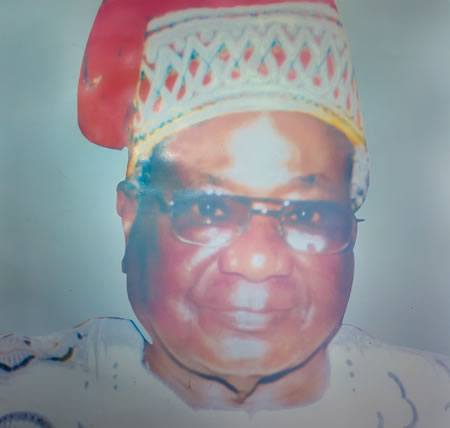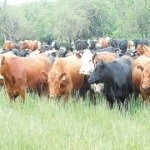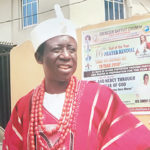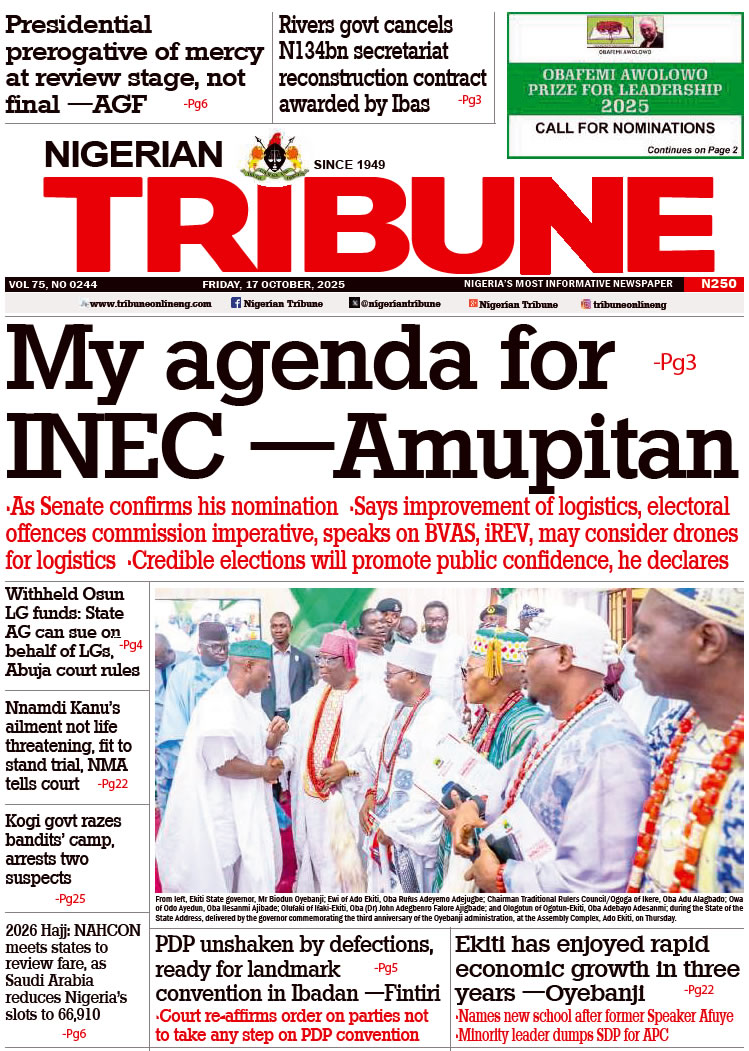How was your growing up years?
I was born in Oyo here in Ile Otun Baale Apaara. Incidentally, I am the present Otun Baale Apaara of Oyo. I was born in 1929, I hope. I was baptized in Methodist Church, Apara in 1930. On the certificate, it was written, age: Infant. So, I decided to choose a year earlier than that date and that is why I choose 1929 as my date of birth. Something happened in my family: a child was born on October 27, 1929 and I said I must be one day older than that child. That is why I have chosen October 26 and that is the date I use till date. I will be 90 in October this year, if I am still around.
I went to Methodist School, Apaara. I was enrolled there in 1935, January. I was there until I had read Standard Four which was the highest class in the school at that time. I had to complete my primary education in St Andrew’s Primary School. I passed out in 1943. In those days, when you had finished your primary school, you could be a teacher. So, I was a teacher in 1944. I took entrance examination to Wesley College, Ibadan. I was there from 1945 to 1948.
What is the level of parental influence on your life?
My parents were farmers. They lived in Oyo here and had their farm some 12 miles away where they stayed the whole week and came back at the weekend. Sometimes, they kept two or three weeks away before coming back. I had my father’s mother here in Oyo here taking care of me and the siblings. But at the weekend, we would go to the farm to bring home food for the week: 12 miles away, after school on Friday, we would go on foot and on Saturday, we would have to come back, carrying loads because, on Sunday, we had to go to church; it is compulsory for us to go to church on Sunday. That is why we would return on Saturday.
What informed your choice of profession as a teacher and did you find the job interesting?
It was almost automatic for Methodist pupils. I never wrote any application: Immediately after finishing Standard Six, I went to the school manager who was a reverend. He told me, ‘Go to Fiditi’ and that was how I became a teacher.
I have not had any other job so, I cannot compare. Even when I was briefly in politics as a counselor in Oyo here from 1958 to 1961, in those days, you will still be doing your work, attend council meetings and you will be paid sitting allowance. Even if you are in the House of Assembly or in the House of Representatives, you will still be doing your job, but attending meetings of the legislature. So, I was a teacher all the time and I never had any other job.
At what point did you embrace writing books and why the choice of Yoruba Language?
In my college days, I love reading literature books, but the books I read in the college library were English books, written by renowned authors. When I left college, I continued reading these books, buying from bookshops. I was thinking of writing in English; I know I would have written in English, but for the request by the Western Regional Literature Committee. In 1954, the Committee advertised in the Daily Times for anybody who could write in Yoruba Language to write something contemporary and realistic; the type of books written by D. O. Fagunwa which were on fairies and witches. So, I felt I should try it. I wrote a manuscript which I sent to the Committee. It was acknowledged, but that was the end of the activity because I heard nothing again from them. I had written the novel in an exercise book which I posted to them. I was then in the Akure area. They said they got it and that they would be contacting but they never did.
That must be discouraging…
It was indeed. In fact, I did not make any other attempt until 1960, six years after I sent that script to them. In 1960, there was another advertisement by the same Committee, asking ‘where can we find Oladejo Okediji’? It was the Independence Year and I was then already in Ile-Ife. I wrote back and gave them my address. They said they wanted to use my script for a competition for the Independence celebration and I said okay. But, again, I heard nothing from them. In that same year, I just heard that one Femi Jebooda had a book, Olowolayemo and that it was the book that won the competition and that was the end.
Did you know if they ever use the script for the Independence celebration?
They never use it. In 1966, another six years after I sent first script, there was another advertisement by one Dr S. A. Babalola, who later became Professor Adeboye Babalola, asking to know where I was again. I gave my address in Ile-Ife. He wrote back to say, ‘where is that script or a copy of it?’ I had no copy because it was handwritten and I had sent it to them. Then, he said what happened was that they were passing the script from one member of the committee to another; that the final person who was handling it was D. O. Fagunwa and that Fagunwa had died, at that time, some three years back and so they cannot find it. Nobody knows where the first script is till now. Babalola pleaded that I should write another.
Typewriters have come to Nigeria by then. So, I went to buy one to type out another story. This time, I made carbon paper copies. I sent the original to them. I did not send to the Committee; I sent it to Babalola who was the secretary. About two weeks after, I got a letter from Longman Publishers in Lagos that Babalola gave them my script and they thought it was publishable, but I should rather use the new autography, not the old one that we had been using. They sent me copies of the way the new autography was written. It was not a rejection so, I had to try and type out the same story. But when you are writing and you want to copy it again, you will be making alterations as you would not leave it as it was originally. So, what I did was I improved on the story and sent it back to them. They took the new script and gave it to their readers. One of the readers said, “If you want to publish and you only want to be applauded, you might use the new autography. But if you want people to read, people will not use the new autography; they will prefer the old they have been using’. I got that report and started the third time to type in the old autography where you had, for examples, aiye for aye and eiye for eye and word partition and so on.
I typed in the old autography which was the third time of writing the same story, and I sent it back to Longman. They sent it back to me and said, “No, we didn’t ask you to change. We wanted to know your opinion. We sent you the brochure for the new autography, but you wrote in the old autography’. So, I typed for the fourth time again for my first book, Aja Lo Leru. That is how Aja Lo Leru came into being and when it was published, it received encouraging acceptance from the public and it encouraged me to continue to write.
Your books portray societal ills and the corruption among the government and their collaborators in the working class. You emphasised in Rere Run that these problems cannot be resolved. Why this pessimistic approach?
Are the problems still not with us? Things will not change. Even right now, what “Rere Run” is about continues: workers are still at the receiving end. They cannot be given N30, 000 as minimum wage a month while a senator can get as much as N13 million. It will continue like that forever. Well, pessimistic but I think also realistic. That is human nature. The late Pa Michael Imoudu worked tirelessly to improve the conditions of working class in the country. Did he die a pauper?
You are a renowned writer, how financially rewarding is your profession as a writer?
Not financially rewarding at all. But I feel fulfilled and I am happy about it. It is not financially rewarding, as you can see in the environment and surrounding in which I live. But I feel accomplished.
Retrospectively, do you have any regrets being a writer?
If I had, I would not say I am accomplished. I think I am alright. If I had a chance, I would want to live exactly like this again.
Given what you went through to become a writer, can you encourage any of your children to take to writing as a profession?
Of course, I would if there is anybody with writing inclination. I would encourage such a person because I don’t believe that money is the end of the world or that one should be running after riches. My belief is that you just express yourself; live your own life as it comes. I am enjoying this atmosphere now…
Did any of your children have such an inclination?
Almost all of them are graduates anyway. One is an artist: a professor in the United States. He writes on arts and each student would write on a project to complete their course of study. So, all my children have written something and so they are all writers.
You wrote about the impossibility of resolving the pervading problems around us. In your growing up years, what was the Nigeria of your dream?
Well, I have never thought of this. But in those days when I started teaching, I was teaching as a missionary teacher and there was no hope of any pension at all. You went on teaching until you die in the classroom. So, I was not looking forward to any big finance when I started teaching. Until the early 1950s, there has never been any strike in Nigeria. People were satisfied and contented with what they got. In those days, we had English government in Nigeria. We never thought of becoming say governor, senator or even president then. We thought these Oyinbo people were made to govern us. This remained so until people like the late Herbert Macaulay came and started telling us that we too could govern ourselves. It was in those days that Dr Nnamdi Azikiwe was with Macaulay. That was the set of people who told us that we could manage our affairs.
When Chief Obafemi Awolowo came, he was more organised than these people and so, he too made a lot of improvement to what had happened. We were happy that things were changing. But I had become brainwashed by people like Azikiwe and so, I was in the NCNC. But politics then wasn’t a do-or-die affair, unlike what we have now; it was friendship. In the council, we were friends and even in town.
WATCH TOP VIDEOS FROM NIGERIAN TRIBUNE TV
- Relationship Hangout: Public vs Private Proposals – Which Truly Wins in Love?
- “No” Is a Complete Sentence: Why You Should Stop Feeling Guilty
- Relationship Hangout: Friendship Talk 2025 – How to Be a Good Friend & Big Questions on Friendship
- Police Overpower Armed Robbers in Ibadan After Fierce Struggle






